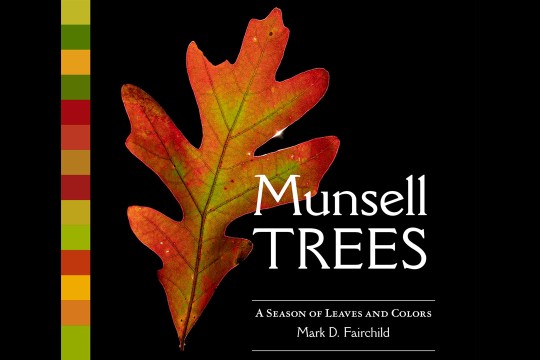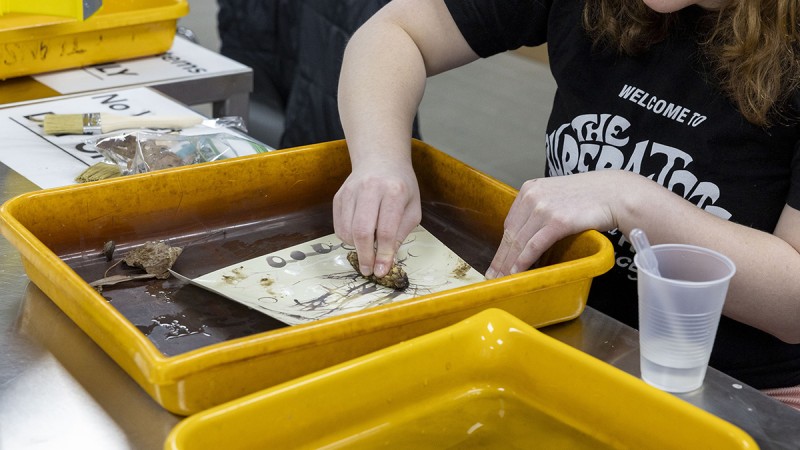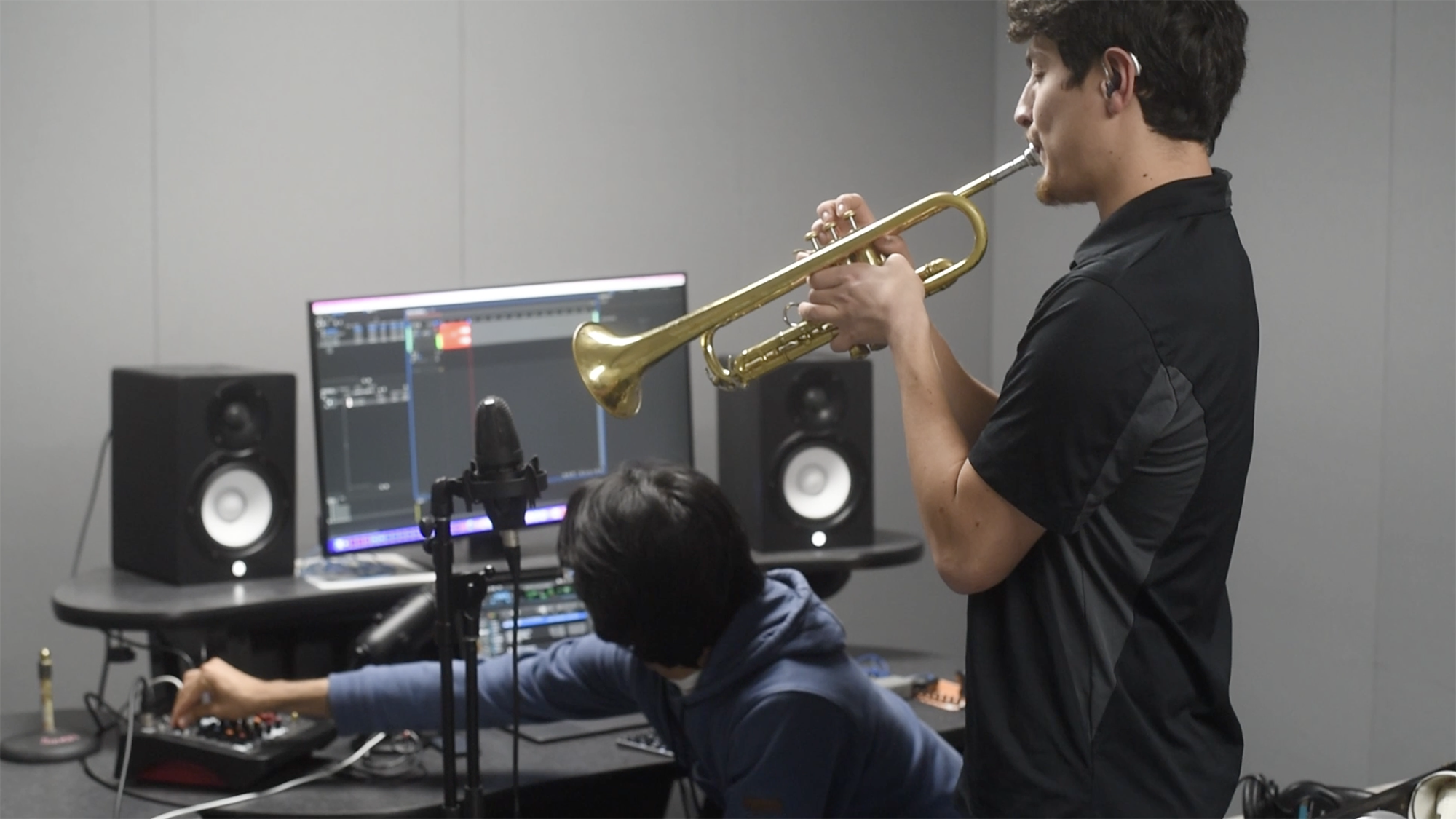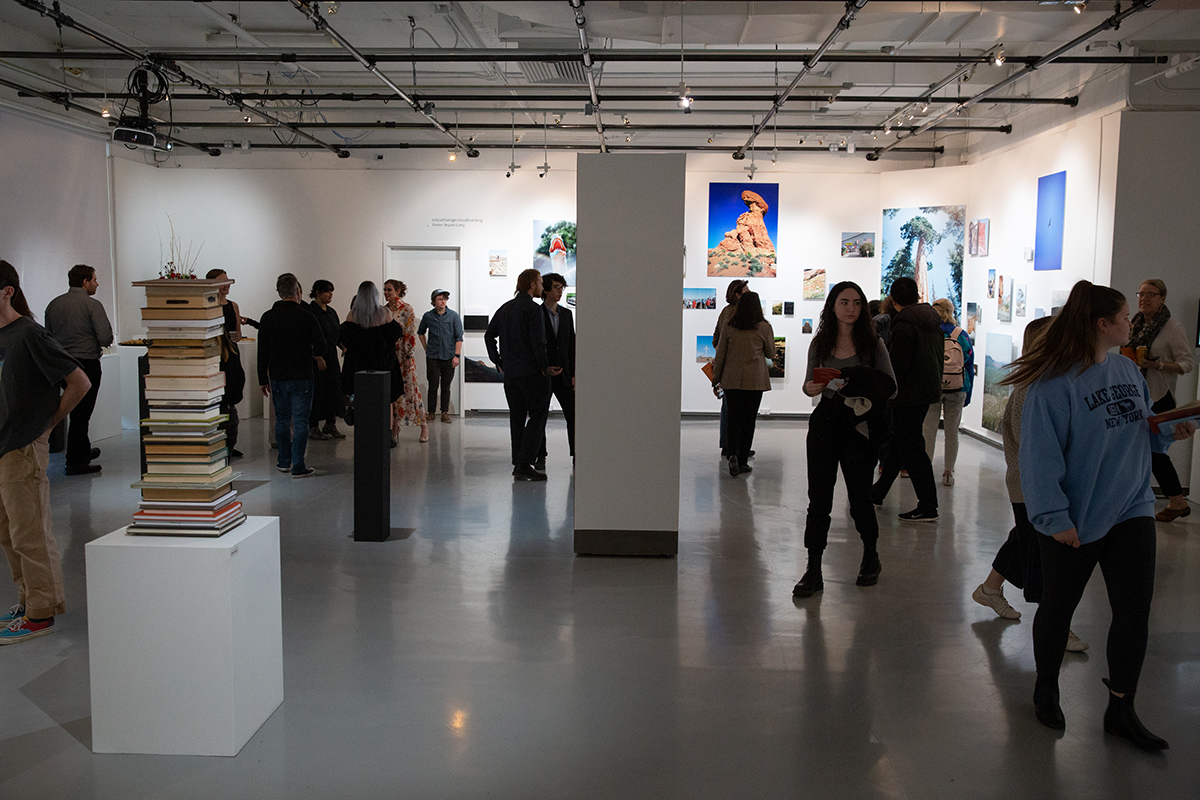Photography and Related Media Master of Fine Arts Degree

Photography and Related Media
Master of Fine Arts Degree
- RIT /
- Rochester Institute of Technology /
- Academics /
- Photography and Related Media MFA
Earn your graduate photography degree at RIT, ranked by U.S. News & World Report as the 6th best fine arts school for a graduate degree in photography.
6th
Graduate Studies in Photography (MFA)
Overview for Photography and Related Media MFA
Learn from full-time faculty members who exhibit and publish in renowned national and international forums.
Scholarships and graduate assistantships that include opportunities to work as teaching assistants, archival and library assistants, faculty research assistants, gallery assistants, and more.
Dedicated graduate studio spaces, computer labs, and printers.
World-class photographic facilities, which recently underwent a multi-million-dollar renovation in 2021.
RIT's graduate degree in photography emphasizes an expansive interpretation of photography as a conceptual art form, with the intention of engaging and nurturing the individuality of each student in their continued development as innovative, critical artists in the world. Successful completion of the MFA in photography enables you to become a successful visual artist and to seek careers in education, archives, museum or gallery work, and as a professional photographer.
MFA in Photography
RIT's MFA in photography is among the best photo schools in the country. We are ranked 6th by U.S. News & World Report (2022) as one of the best fine arts school for a graduate degree in photography.
In the photography MFA, you'll refine your technical and artistic photographic skills while you create a new body of work. Ample time is spent creating work and refining your personal artistic vision. Elective courses are available in dynamic areas such as video, printmaking, painting, sculpture, communication design, crafts, bookmaking, graphic design, new media, computer graphics, art history, and archival preservation and conservation. Students also have opportunities to enhance their studies through independent studies and internships.
Graduate Photography Thesis
Your MFA in photography culminates in a graduate thesis exhibition, where you will install and exhibit an original body of work. The thesis publication is documentation of the thesis project, which must be submitted in digital form. It must contain an extended artist statement and a presentation of the majority of thesis artwork. The thesis defense is a public presentation made by the student, in explanation of the thesis project, creative research, and exhibition.
Photography Faculty
Eleven full-time faculty members, all critically regarded for their artistic work in exhibition and publication, contribute to the MFA in photography. The faculty brings individual expertise and dedication to their work with graduate students, encouraging intellectual inquiry of contemporary art-making practices and aesthetics. The MFA in photography is supported by a staff of 30 full-time faculty members from the RIT's School of Photographic Arts and Sciences and School of Art; adjunct faculty members from George Eastman Museum; as well as noted regional, national, and international practitioners, critics, and historians.
World-Class Photography Studios and Facilities
You'll spend time creating in a range of top facilities designed for you to explore, learn, and develop your photography skills and techniques. The William Harris Gallery supports the exhibition of graduate thesis work, student work, and the works of contemporary image-makers. It maintains a calendar of exhibitions, public lectures, and receptions. Importantly, it also provides real-world experience for graduate students to learn firsthand about gallery operations, installation, and marketing and communications as a gallery manager or staff member.
The Photo Cage puts state-of-the-art photography equipment right at your fingertips. It includes a range of equipment you can checkout for your use, including cameras (DSLR, film, medium- and large-format), video cameras, and camera accessories including lights, audio recorders, computers, monitors, tripods, rigs, cine rails, and more.
In addition to gallery spaces, students have open access to dedicated studio spaces and world-class imaging equipment, including:
- Professional gallery spaces
- Kreonite analog color processor
- Lambda digital chromogenic processor
- Alternative process facilities and chemicals
- Black and white and color darkrooms
- Lighting studios
- 35mm, medium, and large format film cameras
- 35mm and medium format digital cameras
- Video equipment, such as Ronin stabilizers, dollies, and more
- Sound equipment and dedicated recording studio
- Access to printmaking, glass, woodshop, and other art-making facilities
-
A world-class experience
Our program gives MFA students access to faculty who are experts in their field, unparalleled facilities, and a curriculum that focuses on developing critically thinking artists.
-
Join us for Fall 2025
Many programs accept applications on a rolling, space-available basis.
-
30% Tuition Scholarship for NY Residents and Graduates
Now is the perfect time to earn your Master’s degree. If you’re a New York state resident with a bachelor’s degree or have/will graduate from a college or university in New York state, you are eligible to receive a 30% tuition scholarship.
-
Next Steps to Enroll
Accept your offer of admission and take the next steps toward becoming an RIT Tiger.
Careers and Experiential Learning
Cooperative Education and Internships
What makes an RIT education exceptional? It’s the ability to complete relevant, hands-on career experience. At the graduate level, and paired with an advanced degree, cooperative education and internships give you the unparalleled credentials that truly set you apart. Learn more about graduate co-op and how it provides you with the career experience employers look for in their next top hires.
Co-ops and internships take your knowledge and turn it into know-how. Co-op in the College of Art and Design provides hands-on experience that enables you to apply your artistic capabilities in dynamic professional settings while you make valuable connections between classwork and real-world applications.
Cooperative education, internships, and other experiential learning opportunities are encouraged for graduate students in the MFA in photography and related media.
Creative Industry Days
Connect with Design Industry Leaders
RIT’s Office of Career Services and Cooperative Education hosts Creative Industry Days, which connects students majoring in art, design, film and animation, photography, and select computing majors with companies, organizations, creative agencies, design firms, and more. Creative Industry Days are a series of events that allow you to network with company representatives and interview directly for open co-op and full-time employment positions.
Featured Work and Profiles
-
Photographic Sculpture
Hugo Teixeira "Dog Days on the Chaparral" is an installation comprised of three photographic sculptures made in response to the question, “where are you from?” Although I define myself as both Portuguese...
Read More about Photographic Sculpture -
Art and sustainability: Growing a photographic garden
The photo MFA program's commitment to sustainable practices includes a "photographic garden" containing plants that students and faculty can use for various photographic processes.
Read More about Art and sustainability: Growing a photographic garden -
New York City Trip-2024
Gregory Halpern This year's Fine Art Trip to New York City.
Read More about New York City Trip-2024 -
Graduate student connects with Rochester's famed photo history
With Rochester at the epicenter of historical photography, C. Rose Smith has leveraged all that the area has to offer during her studies at RIT.
Read More about Graduate student connects with Rochester's famed photo history -
MFA candidate's photography analyzes environmental future
After working in psychology, Nathan Rochefort found a new calling to provide visual context for how the future is envisioned during a time of environmental uncertainty.
Read More about MFA candidate's photography analyzes environmental future -
Photography in NYC, 2022
Gregory Halpern An annual class that takes place in New York City where we meet and learn from some of the most influential people in the Photography world. The class is available to graduate and undergraduate...
Read More about Photography in NYC, 2022
Curriculum for 2024-2025 for Photography and Related Media MFA
Current Students: See Curriculum Requirements
Photography and Related Media, MFA degree, typical course sequence
| Courses | Sem. Cr. Hrs. | |
|---|---|---|
| First Year | ||
| PHGR-701 | Histories and Aesthetics of Photography I |
3 |
This course, the first in a two-semester sequence, will present an overview of the multiple and intersecting aesthetics, applications, perceptions, and philosophies of photography. Readings and discussions will examine the emergence and establishment of fine art photography, documentary and photojournalism, photography in the sciences, commercial and pop-cultural photographic applications, photography in the political arena, and photography as a mode of social interaction and identity formation. The class will also study the evolving technical history of photographic processes and the proliferation of critical theoretical perspectives on the medium during its first 100 years. (This course is restricted to CAD degree-seeking graduate students.) Lecture 3 (Fall). | ||
| PHGR-702 | Histories and Aesthetics of Photography II |
3 |
This course, the second in the two-semester sequence, will offer an in-depth study of key historical, critical, and theoretical issues in photographic visual culture in the modern, postmodern, and contemporary periods. The course will explore aesthetic trajectories in modern and contemporary photography from the emergence of the modernist Avant Garde at the beginning of the 20th century to such contemporary phenomena as the deadpan aesthetic, performance documentation, fictive photography, and photographic appropriation. This course will also examine the evolving language of commercial photography, stylistic and ethical approaches to photojournalism, photography and the politics of the museum, vernacular photographies, and the presence of digital technologies and social media networks in the contemporary global media age. (This course is restricted to CAD degree-seeking graduate students.) Lecture 3 (Spring). | ||
| PHGR-703 | Studio Core I |
6 |
This critique course, the first in a two semester sequence, will establish a working methodology, critically engage with peers, and develop a body of new artwork. At the conclusion of the semester, all students will participate in a work share event. (This course is restricted to IMGART-MFA Major students.) Studio 9 (Fall). | ||
| PHGR-704 | Studio Core II |
6 |
This critique course is the second in a two semester sequence. Having established a working methodology in Studio Core I, students will continue to experiment and produce a significant body of work through critical engagement with their peers and their own research and experimentation. Successful completion of the course will result in advancement to half-candidacy via a formal review by MFA faculty. (Prerequisites: PHGR-703 or equivalent course.) Studio 9 (Spring). | ||
| PHGR-716 | Integrated Practices I |
3 |
In this course students will integrate writing, research methods, and experimental problem solving skills to further develop studio practices through integrated project based assignments and projects. Students will hone their skills in art practices, critical analysis, strategies for making, and writing about artwork through developing expanded practices within studio experimentation and artistic thinking. Throughout the semester, the students will become familiar with multiple research facilities throughout the University and the region. (This course is restricted to IMGART-MFA Major students.) Lecture 2, Studio 3 (Fall). | ||
CAD Studio Elective* |
3 | |
Professional Elective** |
3 | |
Open Elective |
3 | |
| Second Year | ||
| PHGR-721 | Research Core I |
3 |
This course, following successful completion of half-candidacy, will outline the policies and procedures required for the MFA thesis defense and thesis publication for this program of study. Throughout the course, students will refine their research, presentation, and writing skills. Through assignments and in-class discussion and critique, students will begin developing their thesis defense presentations, conduct research relevant to their work, and begin drafting their thesis publication. (Prerequisites: This class is restricted to students in IMGART-MFA with department permission.) Studio 6 (Fall). | ||
| PHGR-723 | Research Core II |
3 |
This course is the second in a sequence of two courses focusing on the completion of the thesis publication and thesis defense. Supported by the research tools and resources outlined in Research Core I, students will conduct mock defenses and complete all components of the thesis publication. At the conclusion of the course, students will successfully submit their thesis publication to ProQuest. (Prerequisite: PHGR-721 or equivalent course.) Studio 6 (Spring). | ||
| PHGR-724 | Professional Development for the Emerging Artist |
3 |
This course prepares students for entering a career in the arts. Course content covers practical information related to professional practice such as crafting a CV, grant writing, writing an artist’s statement, creating a professional application packet and researching exhibition spaces and other opportunities for artists. (This class is restricted to degree-seeking graduate students or those with permission from instructor.) Lecture 3 (Fall). | ||
| PHGR-890 | Thesis |
12 |
Students produce a thesis as a component of the MFA degree in Photography and Related Media. The completion of the thesis exhibition, from artwork to the installation, is the focus of this course. (Co-requisites: PHGR-721 or equivalent course.) Thesis 6 (Fall, Spring). | ||
Open Electives |
9 | |
| Total Semester Credit Hours | 60 |
|
* CAD Studio Elective refers to any graduate level course in the College of Art and Design that includes a studio component.
** Professional Elective refers to graduate studio courses offered in the Photography and Related Media program (PHGR).
Students are also interested in
Admissions and Financial Aid
This program is available on-campus only.
| Offered | Admit Term(s) | Application Deadline | STEM Designated |
|---|---|---|---|
| Full‑time | Fall | February 1 priority deadline, rolling thereafter | No |
Full-time study is 9+ semester credit hours. International students requiring a visa to study at the RIT Rochester campus must study full‑time.
Application Details
To be considered for admission to the Photography and Related Media MFA program, candidates must fulfill the following requirements:
- Complete an online graduate application.
- Submit copies of official transcript(s) (in English) of all previously completed undergraduate and graduate course work, including any transfer credit earned.
- Hold a baccalaureate degree (or US equivalent) from an accredited university or college. A minimum cumulative GPA of 3.0 (or equivalent) is recommended.
- Submit a current resume or curriculum vitae.
- Submit a personal statement of educational objectives.
- Submit two letters of recommendation.
- Entrance exam requirements: None
- Submit a portfolio. View portfolio requirements.
- Submit English language test scores (TOEFL, IELTS, PTE Academic), if required. Details are below.
English Language Test Scores
International applicants whose native language is not English must submit one of the following official English language test scores. Some international applicants may be considered for an English test requirement waiver.
| TOEFL | IELTS | PTE Academic |
|---|---|---|
| 88 | 6.5 | 60 |
International students below the minimum requirement may be considered for conditional admission. Deaf and hard-of-hearing test takers with significant hearing loss do not need to take the listening and speaking sections for the TOEFL and IELTS. Each program requires balanced sub-scores when determining an applicant’s need for additional English language courses.
How to Apply Start or Manage Your Application
Cost and Financial Aid
An RIT graduate degree is an investment with lifelong returns. Graduate tuition varies by degree, the number of credits taken per semester, and delivery method. View the general cost of attendance or estimate the cost of your graduate degree.
A combination of sources can help fund your graduate degree. Learn how to fund your degree
Accreditation
The MFA program in photography and related media is accredited by the National Association of Schools of Art and Design (NASAD).
Related News
-
March 3, 2025

RIT storytellers capture the heart and hustle of Special Olympics athletes
Students from various majors across RIT made a website providing wall-to-wall coverage of the 2025 Special Olympics New York Winter Games. This was the fourth year RIT partnered with Special Olympics to document the events.
-
November 6, 2024

MFA program blends art and sustainability in growing photographic garden
RIT's MFA in photography and related media's commitment to sustainable practices includes a "photographic garden" containing plants that students and faculty can use for various photographic processes.
-
October 9, 2024

The color science of leaves in a western New York park is focus of RIT Press book
Black oak, crabapple, crimson maple—a color scientist finds inspiration in the woods in the new book Munsell Trees: A Season of Leaves and Colors, published by RIT Press.
Contact
- Delaney Ball
- Assistant Director
- Office of Graduate and Part-Time Enrollment Services
- Enrollment Management
- 585‑475‑6933
- Delaney.Ball@rit.edu
- Joshua Thorson
- Associate Professor
- School of Photographic Arts and Sciences
- College of Art and Design
- 585‑475‑2823
- jjtpph@rit.edu
School of Photographic Arts and Sciences


























